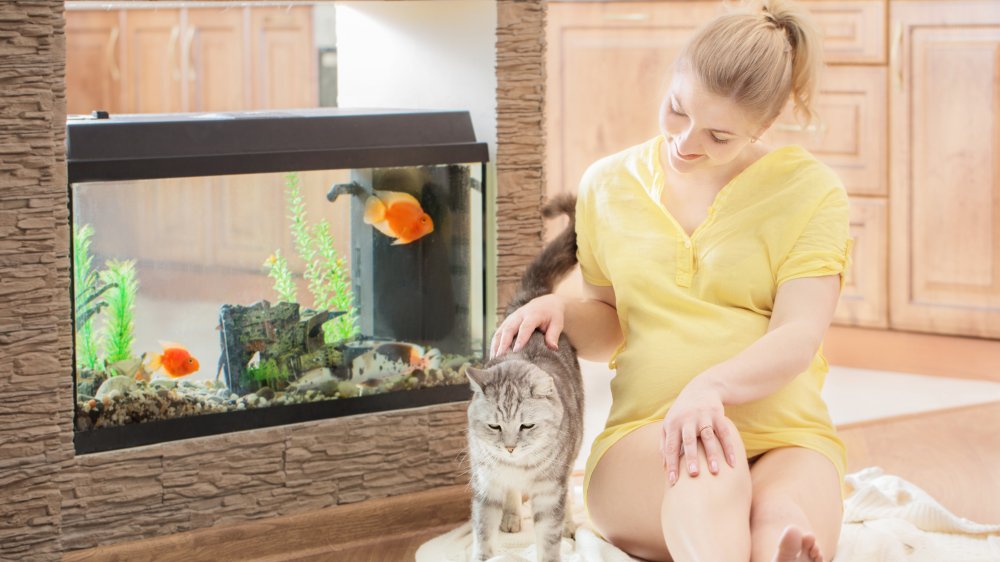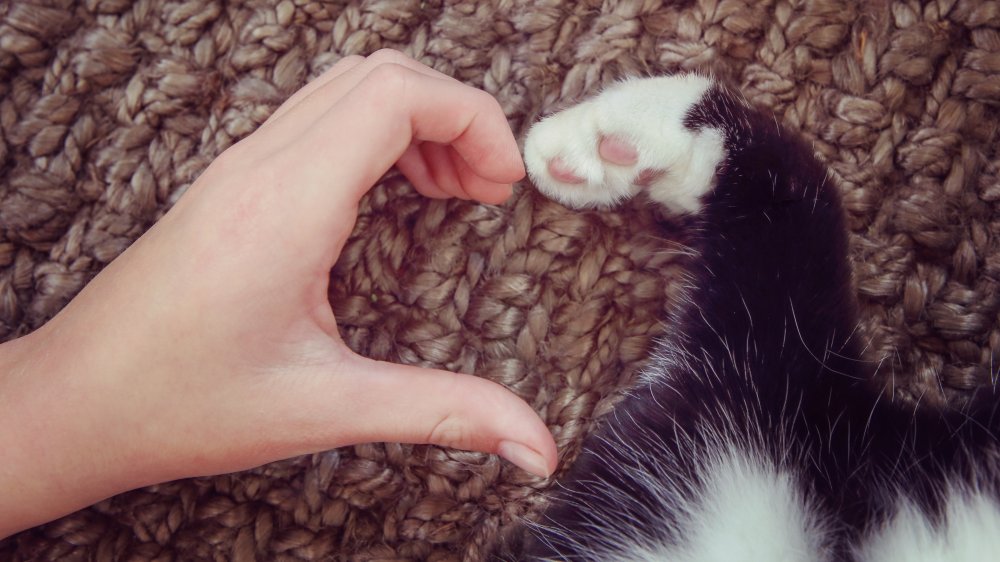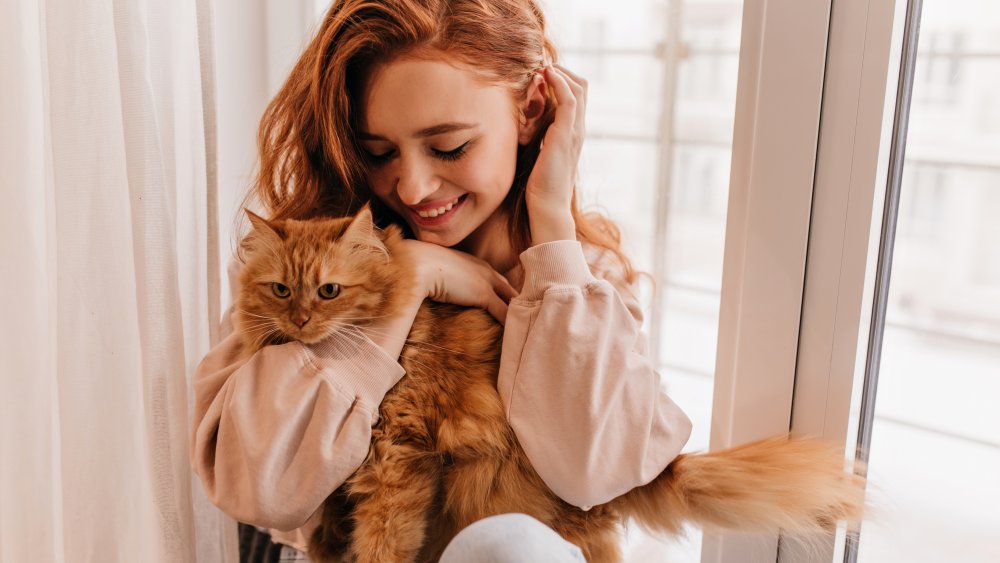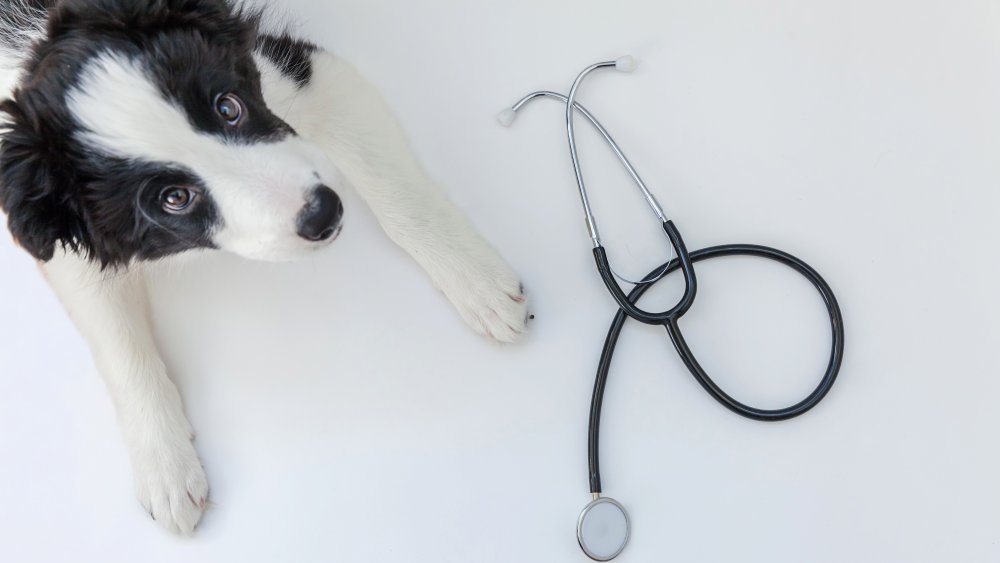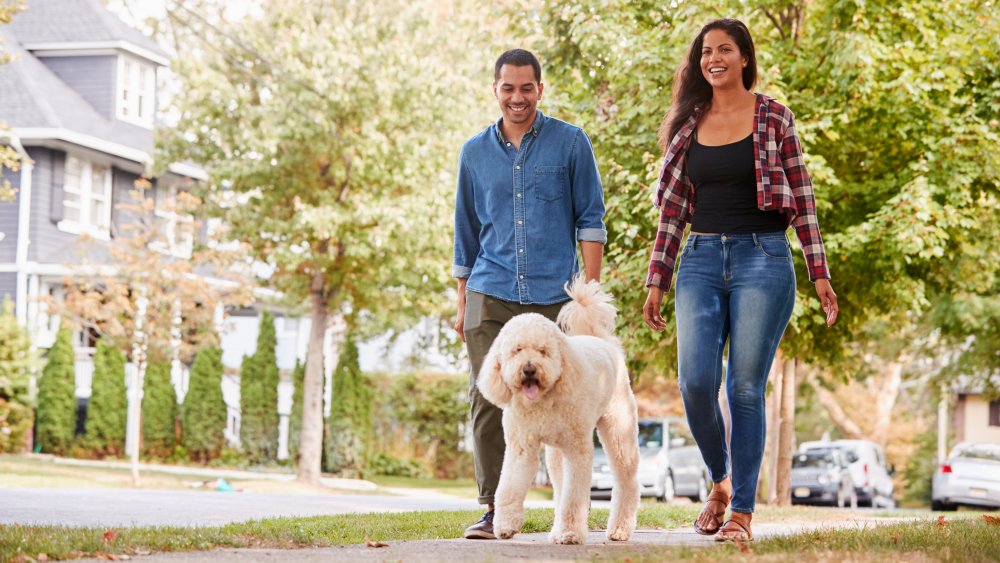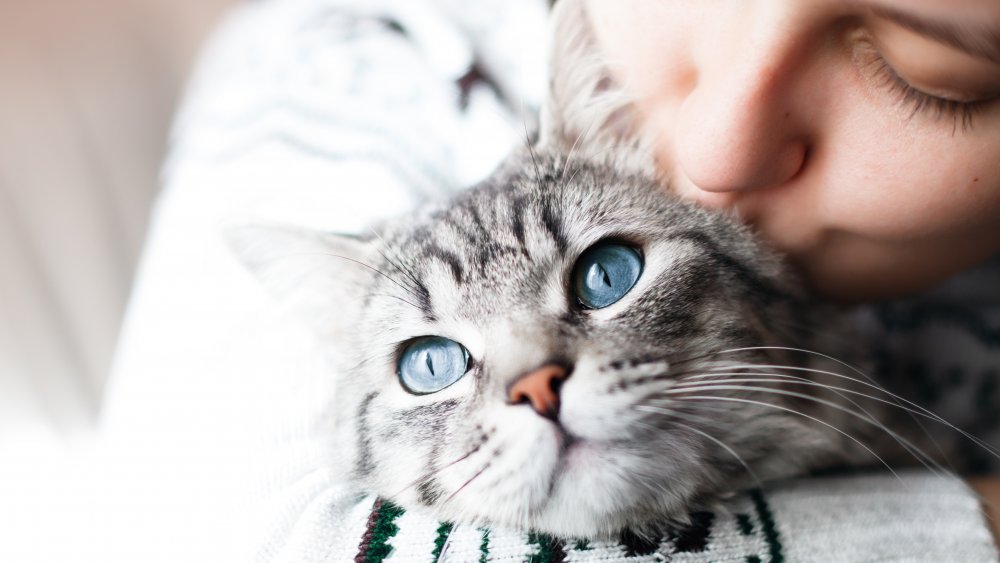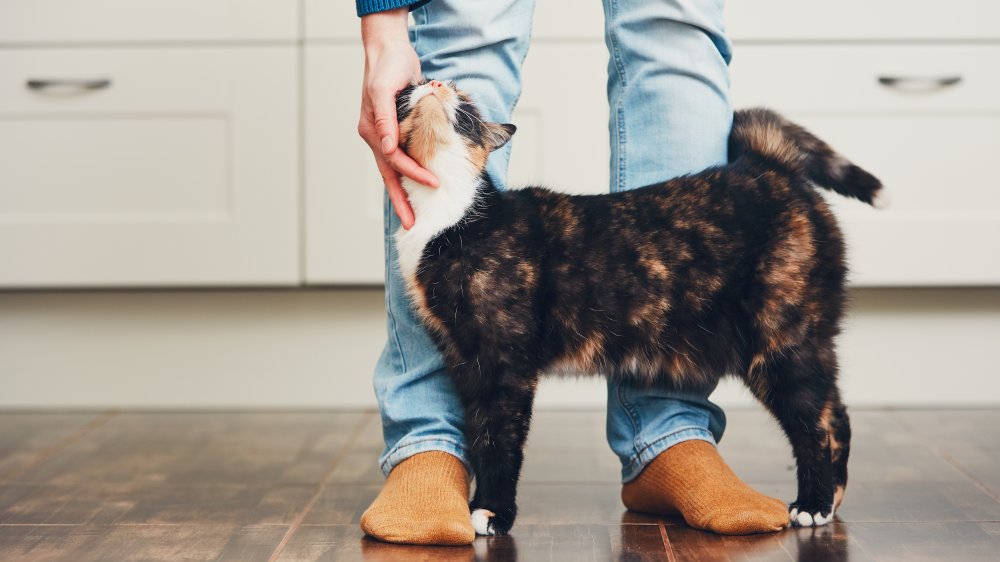When You Have A Pet, This Is What Happens To Your Body
Cuddling up with your pet is the purrfect way to end any day. There's nothing quite like getting home from a grueling eight hours at the office to see your pet excitedly awaiting you in the window. While our cuddly companions are always sure to bring a smile to our faces, it turns out that these creatures can bring a lot more to our lives than just that.
Pets can impact our health in many more ways than you probably ever realized. Aside from the fact that they're just so cuddly and cute, there's a reason so many people depend on emotional support animals and animal-assisted therapy. And there's a reason that 67 percent of Americans include a pet as part of their families (via the American Pet Products Association). To give you a new leash on life, read on to find out what exactly happens to your body when you have a pet.
You stress less if you have a pet
There is power in petting your furry friend. Taking the time to cuddle up to their pets has been shown to help pet owners stress less — and any pet parent will agree that even just laying eyes on their animal is immediately calming. It's why some universities have taken to allowed dogs on campus during the oh-so-stressful finals week.
Researchers believe this calming effect has something to do with the release of the hormone oxytocin, which is produced to help the body relax. "Dogs have somehow hijacked this oxytocin bonding pathway, so that just by making eye contact, or [by] playing and hugging our dog, the oxytocin in both us and our dog goes up," Duke University's associate professor of cognitive neuroscience, Brian Hare, explained to Miami Herald. "This is why dogs are wonderful in any kind of stressful situation," he added. Or in any kind of situation, really!
In fact, even just watching a goldfish simply swim around its tank has the same calming effect. It's one of the reasons you see these aquatic animals in the waiting room of the dreaded dentist's office, according to The Telegraph.
Having a pet can protect babies from developing allergies
There are people all over the world who sadly aren't pet owners due to allergies, but research has shown that owning one may actually have a pawsitive effect on future generations' propensity for allergies.
A 2004 study published in The Journal of Allergy and Clinical Immunology found that exposing our human babies to our fur babies can help prevent them from developing allergies. Having a pet can also prevent kids from developing both asthma and atopic dermatitis (eczema), an uncomfortable condition that creates inflamed and itchy skin. Surprisingly enough, every family that participated in the study had at least one parent who had existing allergies or asthma, so it would seem that genetics had very little to do with it.
How can this be? "An allergy is our immune system attacking something that it shouldn't attack, because it hasn't been calibrated properly," Jordan Peccia, a professor of environmental engineering at Yale University, told The New York Times. Because of this, he explained that it's important to expose babies during their "first three months of life" to the microbes that pets bring inside on their fur. This early exposure helps their developing systems grow accustomed to these otherwise harmless substances.
Having a pet can help your heart
Being a pet parent can fill your proverbial heart with joy, but it can do a lot more good for your physical heart. According to a 2009 study published in the Journal of Vascular and Interventional Neurology, cat owners are less likely to suffer from a heart attack. But what if you're not a cat person? Another study published in Circulation: Cardiovascular Quality and Outcomes in 2019 found that dog owners are less likely to be re-hospitalized following an initial encounter with heart problems.
Though neither study was able to directly link pets to giving their owners' healthy hearts, researchers suggest that their happy hearts may have something to do with the lower amount of stress hormones that are produced by pet owners. "When the stress response is turned on too frequently, it leads to a lot of wear and tear on the body in general," Neda Gould, an assistant professor from Johns Hopkins, explained to NBC News. Too much stress can essentially wear out your cardiovascular system and lead to serious problems like heart disease, according to the American Heart Association. The best solution yet is to get yourself a pet!
You may sleep better if you have a pet
It turns out man's best friend may not just give you his love and affection, but the best sleep you could ever have. While it may seem like a dog would disrupt your sleep cycle, research has shown the opposite effect. According to a 2017 study by the Mayo Clinic, having your furry friend snuggled up in your bedroom has helped people get some superior snoozing.
"Today, many pet owners are away from their pets for much of the day, so they want to maximize their time with them when they are home. Having them in the bedroom at night is an easy way to do that," Lois Krahn, author of the study and a sleep medicine specialist, said. "And, now, pet owners can find comfort knowing it won't negatively impact their sleep."
Although it seems like the perfect solution for sleepless nights, there is a small catch: You shouldn't share the sheets. The participants who had their dog sleep in bed with them sacrificed some serious sleep. Because of that, it may be best to invest in a dog bed for your furry companion.
Having a pet decreases the risk of depression
Pets are sure to bring a smile to our faces, but this mood-boosting power they possess could actually be enough to help with depression — and owners everywhere are feeling it. According to a survey conducted in 2016 by the Human Animal Bond Research Institute (HABRI), 74 percent of pet parents said that since adopting their fur babies, they felt their own mental health had improved.
Numerous studies have shown that pet owners have happier lives, but scientists don't fully understand how these cuddly creatures do it. Researchers do know that being around our animals helps create oxytocin in our bodies, which helps boost our mood (via Miami Herald). In addition, owning animals has been shown to encourage social interaction, which humans have depended on throughout history to survive. While bonding with others, the body releases neurotransmitters that are responsible for responding to negative emotions, per Medical News Today.
According to a 2015 study cited by Harvard Health Publishing, pet owners were 60 percent more likely to get to know the people who live around them. Let's face it: People love approaching others just to pet their adorable dog.
Having a pet lowers your blood pressure
Because our pets seem to clear away all our worries with the wag of a tail, it makes sense that they can bring our blood pressure down too. A study (via American Heart Association) conducted by researchers in Australia found that pet parents had much lower blood pressure than those without a calming companion. This was true even when both groups' were of similar weight, where obesity can contribute to higher blood pressure, and socioeconomic status, where a stressful job or tight finances is enough to make your blood boil.
High blood pressure can lead to serious issues, like heart disease, but if you find yourself in this category, don't fret just yet. Another study cited by the American Heart Association found that even people with borderline hypertension benefited from adopting an animal. When researchers followed up with them after becoming a pet owner, they found their blood pressure had significantly dropped.
It is believed that 103 million Americans have high blood pressure and many such ones depend on medications to manage the condition. Although pets aren't exactly a substitute for a prescription, coming home to your cuddly buddy at the end of a long day seems like a great additional way to keep your blood pressure at bay.
Having a pet boosts your immune system
Humans spend roughly 90 percent of their time inside, The New York Times reported. Because of this, some scientists have warned that our growing immune systems aren't getting adjusted to enough outdoor bacteria that can then make us seriously sick later on. However, having a pet in your family's home may change this because of the array of organisms they carry inside on their fur.
It sounds gross, but your pet really could be the reason you're staying so healthy. "Dogs are dirty animals, and this suggests that babies who have greater exposure to dirt and allergens have a stronger immune system," James E. Gern, a pediatrician from the University of Wisconsin-Madison who has researched this very topic, told WebMD.
A study published The New England Journal of Medicine even found that Amish children, who grow up surrounded by farm animals, have a stronger immune system and get sick less frequently than other children. Yes, it may be best to grow up with a pet. "If we can't bring our kids to the farm, maybe we can bring the farm to kids," co-author of the study, Dr. Jack Gilbert, told The New York Times.
You're less likely to be overweight when you have a pet
If you're looking to lose some weight or get in shape, walking a dog may be the way to go. According to a study published in the Journal of Physical Activity and Health in 2015, dog owners who regularly take their furry friends on walks are 2.5 times more likely to get their full 150 minutes of exercise each week, which is exactly the amount of exercise that the Mayo Clinic recommends. Even if you go slow, the study showed that the same health benefits were achieved. And walking for just 30 minutes each day can burn over a hundred calories.
Half of adults don't get the recommended amount of exercise they need each week and more than 40 percent of Americans are considered obese, which can lead to serious issues like heart disease, diabetes, high blood pressure, strokes, and some types of cancers, according to the Centers for Disease Control and Prevention. Basically, we're saying you should take your pet for walk, like right meow.
Having a pet helps lower your cholesterol
You can also thank your canine companion for keeping your cholesterol down. According to research, dog owners are more likely to have lower cholesterol and triglyceride levels, which are responsible for keeping your heart healthy. Surprisingly, these pet parents still had low levels regardless of what foods they included in their diets, how much they weighed, or even if they were an active smoker, Harvard Health Publishing explained.
Researchers believe exercise plays a big part in keeping those cholesterol levels low. By regularly walking your cuddly pup, the energy you use triggers enzymes that remove low-density lipoproteins from your body, a bad type of cholesterol that can build up in the blood vessels and cause all sorts of trouble. Too much of it building up in your blood can lead to heart disease, according to WebMD. Although swapping out those McDonald's fries for fruits and vegetables will lower your cholesterol, adopting a pet sounds like a great option too.
Having a pet can strengthen your bones
The next time you reward your good boy with a bone, know that you're rewarding your bones. Whenever you play with your pet or go on a walk together, these movements put just the right amount of pressure on your bones to help strengthen them. Staying on your feet also improves your balance, according to WebMD, which may help avoid an accidental tumble and having a cast for all your (human) friends to sign.
Considering it's unusual to walk our feline friends, they won't be able to strengthen your bones in the same way. However, their purrs can help their own bones. The vibration frequency of a cat's purr ranges from 20 to 150 hertz. "Purrs at a frequency of 25-100Hz correspond with established healing frequencies in therapeutic medicine for humans," Gary Weitzman, a veterinarian and CEO of the San Diego Humane Society, explained to BBC Future. "Bone responds to 25-50Hz and skin and soft tissues to around 100Hz according to researchers." Although their purring may be more beneficial to them than you, Weitzman said the noise is calming to people, which is a "big benefit for humans."
Having a pet growing up lessens your chance at developing anxiety
The healing power of pets is one that can help out owners of all ages. A 2015 study shared by the Centers for Disease Control and Prevention found that kids are less likely to show signs of both social anxiety and separation anxiety if they own a dog. This makes sense given that just being around a snuggly pup raises our levels of oxytocin, a hormone that helps reduce stress in the body. This calming effect may encourage children to socialize with others and gain self-confidence that they may have not had before, keeping them from experiencing social anxiety. Just like adults, kids need to communicate with others, and pets help them do just that.
According to the Anxiety and Depression Association of America, anxiety is the most prevalent mental illness in the United States, affecting 40 million adults each and every year. It's also an illness that most often begins in childhood. While emotional support animals can help humans of all ages manage their anxiety, it may be possible to avoid or lessen anxiety altogether by growing up alongside a four-legged family member.
Having a pet is a natural way to relieve pain
Dealing with pain can be ruff, but luckily pets are here to help. A study published in the journal Anthozoos in 2015 found that patients who participated in animal-assisted therapy while recovering from total joint replacement surgery used significantly less pain medication than those who recovered without a pet present — but how exactly does man's best friend become man's best pain reliever?
Distraction techniques are one way that helps the body manage persistent pain. Shifting your brain's focus onto something outside of the body — like your furry friend — can make your reception to pain a little easier to handle, according to the Pain Management Network.
Owners who suffer from chronic pain seem to see a difference when they have a pet around. "A pet is more powerful than any medication when it comes to comforting, soothing, and distracting you when you are experiencing pain," Maggie Buckley, a chronic pain sufferer herself and former board member of the American Pain Foundation, told Everyday Health.
Having a pet reduces your chances of having a stroke
When blood becomes blocked and is not able to make it to your brain, a stroke can occur, the Mayo Clinic explained. It's a scary situation, but some researchers say that owning a pet can help reduce your risk. "If you have a cat, you're 30 percent less likely to have a heart attack, and you're 40 percent less likely to have a cardiovascular incident like a stroke," veterinarian and Good Morning America's veterinary consultant Marty Becker told Woman's Day.
According to the American Heart Association, adopting a dog even after experiencing a stroke can cut down your risk of an early death by 31 percent. Researchers explained that this is most likely due to the increased amount of exercise pet owners get, which can lower your blood pressure to prevent a stroke from ever happening. Well, hot diggity dog!
You may live longer if you have a pet
While your furry friend may not be able to give you one of its nine lives, your pet can still help you live a longer life. A 2019 study published in Circulation: Cardiovascular Quality and Outcomes found that dog owners were more likely to live longer than petless parents, regardless of whether or not these owners had any pre-existing conditions.
"Keeping a dog is a good motivation for physical activity, which is an important factor in rehabilitation and mental health," Tove Fall, the study's co-author, professor at Uppsala University in Sweden, and veterinarian, explained. Taking pets on a walk around the block provides an array of pawsitive benefits to their owners, and it can even get them socializing with others, whether a neighbor or a fellow pet owner.
"We know that loneliness and sedentary lifestyle is a major risk factor for premature death," Fall told NBC News. "Dogs are an excellent motivation for their owners to get outdoors and walk them." As much as our fur babies need us to care for them, it turns out that they've really been taking care of us all along.

